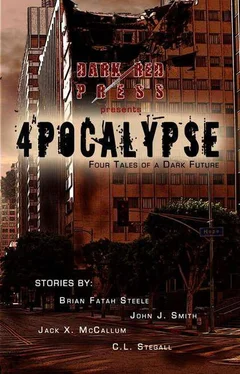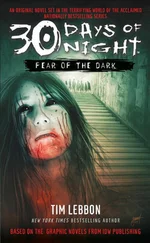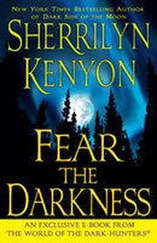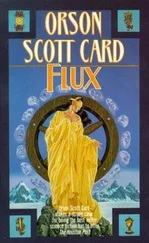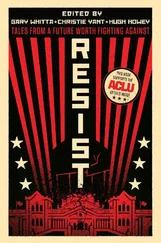“Doctor,” I said, “We saw that the smiling sickness was changing people, their hands, for instance, were becoming more effective weapons. Could this be a… further evolution of that sickness?”
Anders slowly shook her head. “I don’t… there’s nothing like this in nature… ” She gave me that pleading look again.
A seagull hovered over the biomass, doomed by its own curiosity. It settled onto the biomass and sank its beak into it, pulling on a red sinewy string. A flap of tissue rose up over the bird, a flap lined with teeth. It closed on the seagull and the bird was gone.
This living mass of flesh and bone, this biological stew, was hungry, and it ate whatever it came in contact with. I saw scraps of plastic entwined in that raw, repurposed flesh. Glints of glass. Imbedded on one side was a chrome-plated hubcap.
“We can’t let that thing onto the island,” I said.
“Agreed,” Randall said. His tone was calm and controlled. “For all we know, it’s got legs and feet on the bottom.”
The idea made my skin crawl.
“Let’s burn it,” Randall said.
And we did. Or we tried.
As the biomass came closer, not drifting but steering toward Alcatraz, we prepared out explosive cocktails. I had to wonder why the thing had not landed on any of the nearby coasts… Did it know it would receive violent opposition to the north and east? Did it know that San Francisco was a charred wasteland? Was I crediting it with intelligence it did not have?
The closer the biomass came the more I was filled with loathing. I could see muscles flexing in that mass, tendons tightening and relaxing, the beat of many different pulse points, and when it inhaled through those many apertures, it sounded monstrously human. Human too were the blatting farting sounds it made when it exhaled underwater, enabling its weak but sufficient jet propulsion and leaving a scattering of small bobbing turds in its wake, proof that it was eating and excreting birds, fish, and whatever else it could capture.
Doctor Anders appeared to be sickened and fascinated at the same time.
Randall was Randall. Cool and calm, holding a pink Bic lighter in one hand and a Molotov cocktail in the other.
I gave him a nod and flicked my own plastic lighter. The gasoline-soaked rag wicks flared alight, and we threw our bombs. Randall’s struck a ridge of bone and burst open, igniting a blanket of flame on the thing. My bottle didn’t break, but it rolled into Randall’s flames and shattered in the heat, furthering the injury in that one spot.
Hundreds of eyes of every shape and color rolled toward us. Some gave us stony stares. Some gave us angry glares. Some wept.
Randall and I each threw another cocktail, and then the biomass, the leviathan, slowly turned and followed a northern heading toward Angel Island and its riches of flora and fauna, one side still burning until the thing rolled over once, extinguishing the flames and showing it’s true size—it was immense, probably too big to survive without the buoyancy of the sea.
“Let’s hope that was the only one,” Randall said crisply, before walking away.
* * * * *
We kept watch on Angel Island and the bay. We saw no other biomasses, which we now referred to as stews, in the water, but… something was happening on Angel Island. That island was rich and green after heavy winter rains; storms that maintained our supplies of fresh water and helped our small vegetable gardens grow. We made supply runs to Sausalito now; the way to Tiburon passed too close to Angel Island.
The shores of that nearby island were now pink and red, as if the biomass had landed there and was now engulfing the island and consuming all matter in its path, plant and animal.
In December a winter storm that brought strong winds and violent sea surges broke boats free of their moorings in marinas all over the bay. A fine morning a week before Christmas dawned clear and crisp, and we saw that the bay was filled with ships.
I stood in the lighthouse with Ben and looked down at the Bay. Of the many boats drifting past Alcatraz on their way to the open sea, two caught my eye; a fifty-foot ketch and a thirty-five foot sloop. I was told what they were by Randall, later that day. Both appeared seaworthy… and to my untrained eye that meant they were still floating and had nice paint jobs. I assumed, I hoped, that the clean lines and bright paint indicated the boats had been well maintained over the years.
I was watching the boats drift closer and considering calling a meeting when I saw Randall, Renfield and Ayala heading for the dock. I caught up with them as they were getting into one of the Zodiacs.
“Looks like we’re going to have a Merry Christmas after,” Randall said.
They brought back the ketch and the sloop, and a smaller Jeanneau Gin Fizz that Randall claimed as his own.
We had a community meeting. Two adults and two teens refused to leave Alcatraz, our gardening expert Sister Sunshine being one of them.
The rest of us agreed to set sail… For any remote island with vegetation and a source of fresh water.
“We could die out there,” Randall said with a half-smile, “But staying here is not a permanent solution.
When I asked, not without trepidation, which if any of us could sail, Randall, Renfield, and Benjamin raised their hands, as did a young orphan girl named Sissy, who had taken to shyly following me around from time to time. That was good. I could issue commands and suggestions all day, but I could barely swim.
Thirty-one of us would be packed into those boats.
We divided all of our supplies fairly. Doctor Anders begged those who wanted to remain to reconsider, to no avail.
Conaghan took one third of the solar panels. He was sure he could rig them on the smaller boats so we could power a few lights. The big ketch must have had an environmentally conscious owner with money to burn. It was already outfitted with solar panels and had four sumptuous cabins.
It took until the end of January to ready the boats. Every day I watched Angel Island, seeing the red and pink of the biomass claim more and more of the land, until it was climbing up the sides of Mount Livermore, the island’s highest point.
We wanted to make as many supply runs to Sausalito as possible. Thankfully they were easier now. We had not seen a helicopter cross over the Bay in weeks. Just two days before our scheduled departure, with one run left, to raid a pharmacy and a hardware store, the biomass completely engulfed Angel Island… and began to swell.
The sickeningly vital redness of the biomass began to leach out of the lower regions, and the swelling on top of the mass took on an angry dark red hue.
I didn’t like the look of it. Neither did Dr. Anders.
Randall was the one who finally said what we were all thinking.
“That thing’s gonna pop like the world’s biggest zit.”
And so it did. The biomass erupted at sundown, venting yellowish gas and spewing a torrent of pus-colored liquid high into the sky. When the eruption was over the remaining tired looking pale pink skin of the biomass began falling away from mountain and island, revealing bare rock that had been stripped of every living thing. The shed skin formed into balls that rolled into the waters of the Bay
The next morning it began to rain. The rain was yellow. On board the ketch, now named Salvation, Dr. Anders looked at a drop of rain under her microscope.
The rain was filled with parasites.
We were immune, but how many survivors in the bay area were not?
The day after the eruption we said our goodbyes to Alcatraz and those staying behind and set sail in the Salvation, the sloop now called Deliverance, and Randall’s boat, Liberty.
Читать дальше
